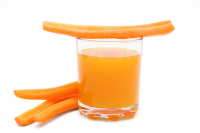Antioxidants
 Definition
Definition
An antioxidant is a substance that protects against oxidation and free radical damage.
How Antioxidant Work
Antioxidants help to protect the cells against the effects of free radicals. Free radicals are molecules which are produced when the body breaks down food. These damaging molecules can also be produced by environmental factors such as exposure to tobacco smoke or radiation. Free radicals can cause damage to healthy cells, and are known to play a role in cancer, heart disease and other diseases of the human body.
Antioxidants can be found in many different foods, including fruits and vegetables, nuts, grains, and some fish, poultry and meats. Antioxidants are vital to our health.
Some of the well known antioxidants include:
- Beta-carotene
- Lutein
- Lycopene
- Selenium
- Vitamin A
- Vitamin C
- Vitamin E
Vitamin A can come from plant or animal products, such as colorful fruits and vegetables, whole milk and liver. It is common for vitamin A to be added to cereal products and other foods as well.
Vegetarians, alcoholics and young children are among those people who may need extra vitamin A. Individuals with conditions such as cystic fibrosis, Crohn’s disease and liver diseases can also benefit from antioxidants.
Some individuals may need more vitamin C than others. They typically include:
- Women who are breastfeeding or pregnant
- Those individuals who are recovering from surgery or major illnesses
- Victims of burns
- People who smoke
Vitamin E can be found in vegetable oils, seeds, nuts, margarine, and leafy green plants. Vitamin E helps to play a role in metabolic processes as well as strengthening the immune system.
Some of the roles antioxidants can play in a healthy human body include:
- Preventing severe eye conditions such as macular degeneration.
- Reducing one’s risk for developing serious conditions such as certain types of cancer, Alzheimer’s disease and heart disease.
- Reducing levels of stress and boosting concentration and energy by getting rid of free radicals.
- Helping to rejuvenate damaged cells. This also results in younger, brighter skin.
Selenium can be found in eggs, fish, red meats, shellfish and garlic.
Combatting free radicals is important to optimum health. Free radicals spread in the body during a process which is called oxidation. Natural antioxidants, called flavanoids, are among the easiest types of antioxidants to introduce into the body.
Free radicals can be exposed in the body in several different ways, including the breakdown of sugars in food, the breakdown of different chemical compounds and medicines, and by exposure to pollutants such as cigarette smoke. Excessive use of alcohol can also be a stimulant for free radical action.
It is also believed that antioxidants can help to repair some of the damage caused by free radicals.
Some recent research has shown that individuals who consume a healthy diet which includes five servings of fruits and vegetables daily helps to reduce their risk of a stroke by up to 25%.
Other sources of antioxidants which are similar to flavanoids can be found in cranberries, tea, pomegranates, and red wine. Lutein is found in kiwi and spinach and the antioxidant known as lycopene is common to watermelons.
References
- Holford, P. The optimum nutrition bible, Little Brown Group (2004)
- Holford, P & Lawson, S. Optimum Nutrition Made Easy How to achieve optimum health, Piatkus Books (2008)
- Murray, M.T. et al., Encyclopedia of healing foods, London : Piatkus (2005)
- The National Research Council. Recommended Dietary Allowances, 10th ed, National Academy of Sciences (1989)
- Werbach, M. Nutritional Influences on Illness, 2nd ed, Third Line Press (1993)
Posted in Antioxidants
Ask a Question Or Join a DiscussionAntioxidant Remedies
Bilberry
The bilberry (or vaccinium myrtillus) has been used for centuries to treat various medical conditions. Also valued as a food for its taste and high nutritional content, this fruit is used fresh or dried. Bilberry is known under several other names, including dwarf bilberry, European bilberry, European blueberries, huckleberry, whortleberry, hurtleberry, blaubeeren, baies de myrtille and petit myrte.
Coenzyme Q10
Coenzyme Q10 is also known to many people as ubiquinone because it is ubiquitous – it exists virtually everywhere in the body. CoQ10 behaves like a vitamin because it serves as a catalyst in certain reactions, and it is not considered to be a “true” vitamin because it is synthesized in human cells. Sufficient amounts of CoQ10 are necessary for a person to enjoy optimum health. Some people – particularly those with heart disease or taking certain cholesterol-lowering drugs – are at a high risk for CoQ10 depletion or deficiency, sometimes with tragic results.
Green Tea
Green tea is obtained by lightly steaming the leaves when they are freshly cut. Black tea is produced by allowing the leaves to oxidize. During the oxidation process, enzymes present in the tea convert polyphenols, which have extensive therapeutic properties.



